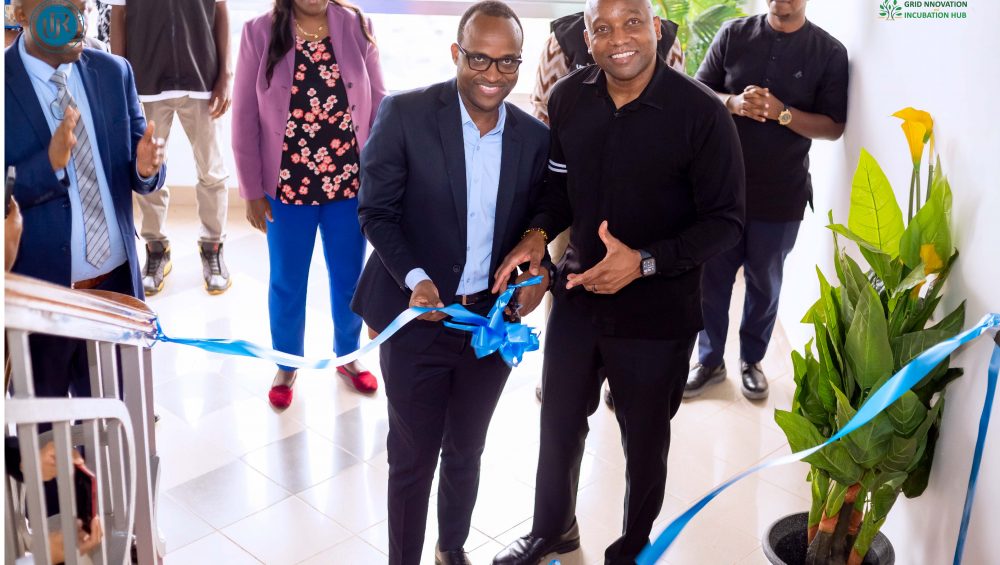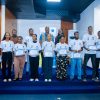Gaspard Twagirayezu, the Minister of Education on Friday November 10, inaugurated a University Innovation Pod (UNIPOD), a United Nations Development Programme (UNDP) funded initiative, aimed at promoting innovation, inter-disciplinary research and nurture the next generation of innovators and entrepreneurs in the University.
The event held at College of Science and Technology (UR-CST), which was one of key activities to mark the second UR Innovation Week, saw young innovators presenting innovative solutions to diverse societal challenges. 18 outstanding projects were recognized and awarded. 8 of them focusing on AI and Internet of things got Rwf5 million each while the remaining ones focusing on different other domains were awarded from Rwf5 million to Rwf1 million
The groundbreaking moment on the sidelines of the University of Rwanda Innovation Week 2023, brought together dignitaries including the Ministry of Education, UNDP representatives, partners, and various stakeholders, including University of Rwanda academic staff and students.
During the official launch, Hon.Twagirayezu said, “Investing in our people is investing in the future of our nation. This maker-space bridges the gap between our schools and the community.
“The country’s ambition is to become a model innovative society, and that journey is now. People who make this journey a reality are students,” he said, urging them to connect their visions to societal problems,” he said.”
You should not count yourselves out of what is happening in this world,” he added, recommending them to utilize the space effectively, innovate more and be available anytime.” he added.
The winning students shared their journeys and motivations behind their solutions.
Among the winners is Marie Ritha Umutoni, a final year student at UR, focusing on Embedded Computing Systems at the African Centre of Excellence in Internet of Things (ACEIoT). She won an award in Internet of Things (IoT) and AI, leading her startup, ‘Ibaba Intelligence Solutions’.
She developed a security system for home surveillance and proximity detection in unsafe areas. It uses inexpensive, non-intrusive components to identify moving objects like humans, animals, and vegetation.
Once a motion is detected, the system can trigger actions like sounding an alarm or notifying owners via SMS or a call to alert them of a potential intruder. To achieve real-time, on-the-edge classification of moving objects, she cleverly combined analog Passive Infra-Red (PIR) sensor data with TinyML inference. This ensures high accuracy and low latency for efficient detection and classification of various moving objects.
Equally, Emmanuel Niyibikora, a crop science student at UR, Busogo campus, developed a unique project called ‘Hair Wastes Shoe Cream’. After observing the wastage of salon hair clippings, he decided to recycle them into a distinctive black shoe cream. His product is a semi-solid, multipurpose product and expected to solve a couple of market demands, especially reducing shoe cream import quantity.
Furthermore, Gasana Bisetsa Jururyishya, a master’s student, whose project is named ‘Farm Vision’, the goal is to address challenges in the agricultural sector by creating a system that enables farmers to forecast and monitor the health status of their crops.
The device, which can be installed in the farm, utilizes an AI model to capture and analyze images, identifying potential issues such as pests. Farmers will be receiving notifications, allowing them to take timely action without physically visiting the farm, streamlining crop management and enhancing overall efficiency in agriculture.
Shauri Kalibatha Jonathan, a student in mechanical engineering manufacturing, IPRC Ngoma, has developed ‘Re-Banatex’. This innovative project focuses on recycling banana trunks into fashion products such as leather, garments, bags, and hair extensions. The goal is to contribute to Rwanda’s growing fashion industry, creating job opportunities for youth and increasing income for farmers.
Maxwell Gomera, the UNDP Rwanda Representative shared that for far too long, Africa has been peripheral to the knowledge economy. “Not because we are not contributing, but because we have allowed ourselves to be placed where we are,” he said.
Gomera mentioned that, Universities in Africa have considered their core business is only ‘Teaching’ and ‘Research’ which never solved today’s problems that they account for. However, this must change today and it is possible as students showed their potential that they can do even more.”







